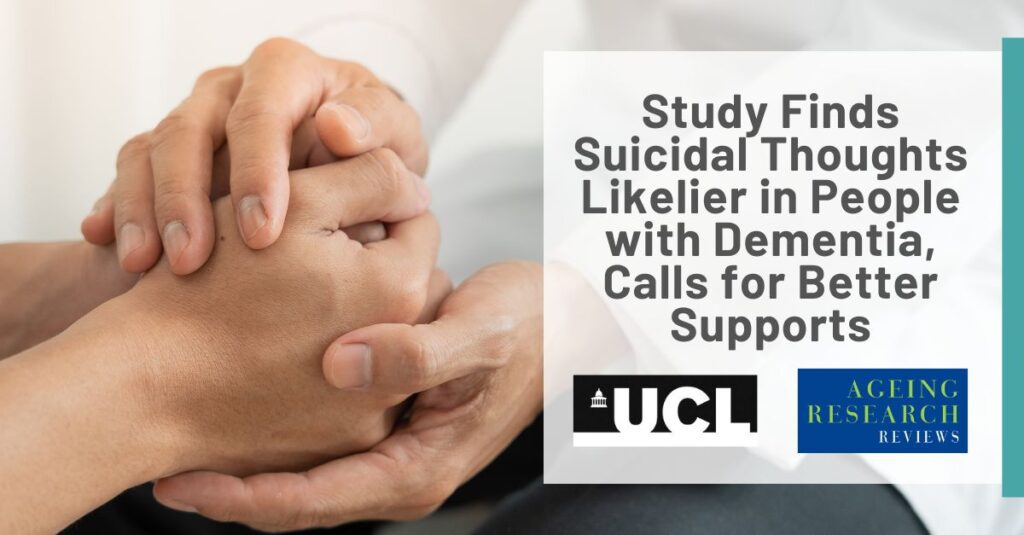Study Finds Suicidal Thoughts Likelier in People with Dementia, Calls for Better Supports

A study conducted by researchers at University College London (UCL) published in the journal Ageing Research Reviews finds that people diagnosed with dementia have a higher chance of experiencing suicidal thoughts but are not more likely to die by suicide than the general population. The authors highlight a growing need for better support for people with dementia and clear guidance for clinicians.
People living with dementias like FTD can experience a wide range of challenging symptoms that have a considerable impact on their quality of life; in FTD disorders, symptoms can range from uncharacteristic behaviors to Parkinson’s-like movement difficulties. As the authors note, not only can neuropychiatric symptoms exacerbate cognitive and functional decline, but they can result in heightened distress among people diagnosed, raising the risk of detrimental outcomes like hospitalization or suicidal ideation.
“Dementia is a growing global health issue as more people live long enough to develop it,” lead author Roopal Desai, PhD, DClinPsy said in a UCL blog post. “People with dementia may be at higher risk of having suicidal thoughts and in particular certain groups such as men and younger people with dementia may be more at risk of dying by suicide, but this field has not been well studied.”
Different Outcomes with Different Predictors
Medical research has identified many factors that can elevate the risk of suicide, with the authors underscoring the role of psychiatric disorders and chronic health conditions in heightening suicide risk among the general population. In dementia, impairments or changes in function in different cognitive domains can make decision-making harder or lead to disinhibition, heightening the risk of suicidal ideation. As noted in the study, however, prior research on dementia and suicide risk turned up mixed findings, with some studies indicating a higher risk and others showing a lower risk.
The authors sought to paint a clearer picture through a meta-analysis, a statistical approach that combines the data from multiple studies that address a similar research question. Starting with thousands of potential studies, the authors removed duplicates and irrelevant data before eventually narrowing their analysis to 54 studies. In comparing the data from the studies, the UCL researchers determined several of potential factors that influenced suicide risk among people with dementia, such as sex and how recent they were diagnosed.
The meta-analysis provided several key findings:
- The estimated prevalence of suicidal ideation is higher in people with dementia than the general population (~10% to ~2%).
- Several studies found that younger people with dementia are at higher risk of suicide than those aged 69 or older.
- Similar to the general population, men with dementia faced a higher risk of attempting or dying by suicide.
- The incidence of suicide attempts and deaths from suicide, however, is similar to the general population. In general, the authors found no elevated risk of suicide attempts in people with dementia.
The authors highlighted a key finding in their study, noting that the implication that dementia increases the risk of suicidal ideation but not attempts or deaths suggests different predictors for the different outcomes associated with dementia. Given the limitations of the current study, such as UCL researchers being unable to conduct a meta-analysis of different outcomes, there are many avenues for future research. In particular, the authors underscore symptom severity, age, and how recent a diagnosis was received as potential risk factors to be researched.
Guidance for Clinicians and Researchers is Needed
The authors of the study emphasize the need for proper support for people living with dementia. In particular, Dr. Desai noted that the study “highlights the importance of providing mental health support and suicide prevention in dementia care, with a focus on age, the severity of symptoms, and sex.”
As highlighted in the study, the National Institute for Health and Care Excellence (NICE), a government health organization that provides national guidance to improve health and social care in the United Kingdom, currently lacks guidelines or specific interventions for suicide prevention among people with dementia. While the United States does not have a direct counterpart to NICE, the Department of Health and Human Services similarly lacks specific guidance for suicide prevention in people with dementia. As a result, people with dementia are likely not being routinely assessed for suicidal ideation.
“It is often assumed that suicide is not an issue in people living with dementia,” said study lead Amber John, PhD. “This study shows that people with dementia are no less likely to attempt or die by suicide than the general population – and indeed are more likely to experience suicidal ideation. This means that suicide risk needs to be taken just as seriously in people living with dementia as in the general population.”
Are you a person living with FTD, care partner, or family member experiencing suicidal ideation? The national 988 Suicide & Crisis Lifeline is available 24/7 in English or Spanish for those who need support when they need it the most; the Suicide & Crisis Lifeline can be reached online or by calling/texting 988. For guidance related to FTD, help navigating diagnosis, or if you simply need somebody to talk to, AFTD’s HelpLine has the support you need; contact the HelpLine at 1-866-507-7222 or info@theaftd.org.
Persons with FTD Advisory Council member Deb Jobe discusses her experience with suicidal thoughts and behaviors in a Guest Feature from AFTD’s Help & Hope newsletter, highlighting how support and proper resources helped her get back on her feet.
By Category
Our Newsletters
Stay Informed
Sign up now and stay on top of the latest with our newsletter, event alerts, and more…
